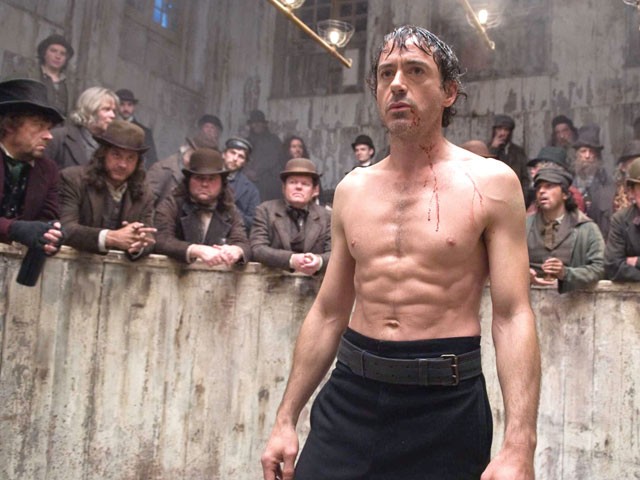It’s difficult to find the exact number, but preliminary
research shows that between movies
and television, this is about the 300th film made
about Arthur Conan Doyle’s deduction-minded
sleuth Sherlock Holmes. And while Basil Rathbone,
who played the character a dozen times in the 1930s
and ’40s, will likely remain the face people conjure
up at the mention of Holmes, Robert Downey Jr.
gives us a wise and witty portrayal of him in this
newest adventure.
Directed with feverish and stylish aplomb by
Guy Ritchie (Snatch, RocknRolla and, unfortunately,
Swept Away), the film bursts into action at the
opening frame, with cameras hurtling down the
cobblestone streets of London — probably in the
late 1800s — while
Holmes has to, in a
matter of minutes,
dispatch an unaware
guard, then rescue
a damsel in distress
from the vile Lord
Blackwood (Mark Strong), who has a thing for
practicing the black arts.
But fear not. This isn’t one of those films that
won’t let you catch your breath. Before long, three
months have rolled by, and Holmes, who is prone
to moodiness when he’s not working, is in a funk,
holed up in his room, and tired of conducting chemical
experiments on his bulldog.
Bring on dapper Dr. Watson (Jude Law), Robin
to Holmes’ Batman. It’s Watson, his often-unwilling
partner-in-crime fighting, or at least detecting, that
shares Holmes’ address, if not the same decrepit
apartment, at 221 B Baker St., and it’s here that he
announces to Holmes, in one of the film’s few unnecessary
plot lines, that he’s going to marry Mary
(Kelly Reilly).
The film is as much a study of Holmes’ habits
and inner workings as it is the story of his going up
against Lord Blackwood, a five-time killer who’s
finally brought to justice and only then reveals his
own determined plot to achieve world domination.
It’s Holmes who dabbles with making order out
of chaos through his use of a large bottle of flies and
music theory. It’s Holmes who likes to talk out loud,
to himself. It’s Holmes who, when out in the world,
can’t help seeing and hearing everything around
him in detail — sometimes subconsciously using
the process of deducing, even if he’s not on a
case.
Aided by a smooth and graceful assist
from Law, Downey owns the film, using his
darting eyes and curious face and, when
called for, his in-shape body to create a different
kind of Holmes than has been seen
before. He can be simultaneously funny and
serious, and proves to be as fast on his feet as
he is in his mind.
The introduction of the mysterious Irene
(Rachel McAdams) complicates the story
nicely, but McAdams is
slightly off her game, and
the character needs to be
filled out more. Yet it’s
obvious from the way
that Holmes and Irene
gingerly dance around
each other that they have a past that
could fill a film.
Any Guy Ritchie fans worrying that he’s crossed over into mainstream fi lmmaking need not be concerned. He’s totally in his element in a number of fi ght scenes, employing his fractured, comic style of fast editing mixed with slo-mo and even still shots of blows being landed. But this is also his most successful attempt at telling a ripping yarn with popular appeal and just enough of his fl ourishes to totally satisfy his fans. He’s made a funny, actionpacked, dazzling period piece. A sequel is already scheduled for release in 2011.
















